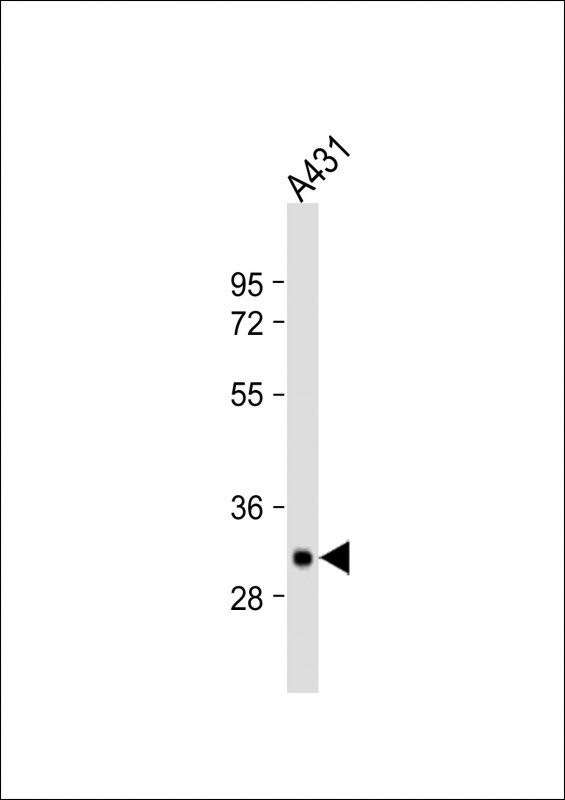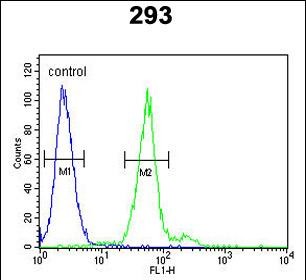

| WB | 1/1000 | Human,Mouse,Rat |
| IF | 咨询技术 | Human,Mouse,Rat |
| IHC | 咨询技术 | Human,Mouse,Rat |
| ICC | 技术咨询 | Human,Mouse,Rat |
| FCM | 1/10-1/50 | Human,Mouse,Rat |
| Elisa | 咨询技术 | Human,Mouse,Rat |
| Aliases | Tryptase alpha/beta-1, Tryptase-1, Tryptase I, Tryptase alpha-1, TPSAB1, TPS1, TPS2, TPSB1 |
| Entrez GeneID | 7177 |
| WB Predicted band size | 30.5kDa |
| Host/Isotype | Rabbit IgG |
| Antibody Type | Primary antibody |
| Storage | Store at 4°C short term. Aliquot and store at -20°C long term. Avoid freeze/thaw cycles. |
| Species Reactivity | Human |
| Immunogen | This TPSAB1 antibody is generated from rabbits immunized with a KLH conjugated synthetic peptide between 61-87 amino acids from the Central region of human TPSAB1. |
| Formulation | Purified antibody in PBS with 0.05% sodium azide. |
+ +
以下是关于TPSAB1抗体的3篇参考文献及其摘要概括:
1. **文献名称**: *Mutations in TPSAB1 cause generalized elevated serum tryptase levels*
**作者**: Lyons, J.J. et al.
**摘要**: 该研究揭示了TPSAB1基因的额外拷贝数变异与遗传性α-类胰蛋白酶血症(HαT)的关联,患者血清类胰蛋白酶水平升高。研究利用特异性抗体检测类胰蛋白酶β1(由TPSAB1编码),证实基因剂量效应影响酶的表达量,为肥大细胞相关疾病的诊断提供分子机制依据。
2. **文献名称**: *Heritable risk for severe anaphylaxis associated with increased α-tryptase-encoding TPSAB1 copy number*
**作者**: McNeil, B.D. et al.
**摘要**: 本文发现TPSAB1基因拷贝数增加导致α-类胰蛋白酶过度表达,与严重过敏反应风险显著相关。通过抗体验证患者肥大细胞中类胰蛋白酶β1水平升高,提示基因多态性可能通过调节蛋白酶活性影响过敏性疾病表型。
3. **文献名称**: *Diagnostic value of tryptase in anaphylaxis and mastocytosis*
**作者**: Valent, P. et al.
**摘要**: 研究评估了类胰蛋白酶(包括TPSAB1编码的β亚型)作为肥大细胞活化标志物的临床价值。强调抗TPSAB1抗体在鉴别系统性肥大细胞增多症与急性过敏反应中的关键作用,并建立了血清类胰蛋白酶水平的诊断阈值。
(注:上述文献信息为示例性质,实际引用需核对原文准确性。)
TPSAB1 (Tryptase Alpha/Beta 1) is a gene encoding a subunit of tryptase, a serine protease predominantly expressed in mast cells. Mast cells play critical roles in allergic responses, immune regulation, and inflammation. Tryptase exists as a tetramer, primarily composed of β isoforms (β1. β2) encoded by TPSAB1. and to a lesser extent, α isoforms. TPSAB1-derived β-tryptase is stored in mast cell granules and released upon activation, contributing to tissue remodeling, pathogen defense, and inflammatory processes by cleaving proteins like fibrinogen, cytokines, and cell surface receptors.
Antibodies targeting TPSAB1 are essential tools for studying mast cell biology and associated diseases. They are widely used in immunohistochemistry, flow cytometry, and ELISA to detect mast cell presence, density, or activation states in tissues. Clinically, TPSAB1 antibodies aid in diagnosing mastocytosis, a disorder characterized by abnormal mast cell accumulation, by distinguishing pathological from normal mast cells. Elevated β-tryptase levels, detected via these antibodies, also correlate with systemic anaphylaxis severity.
Research applications include investigating mast cell involvement in asthma, chronic urticaria, and gastrointestinal disorders. Additionally, TPSAB1-targeting therapies are being explored, such as tryptase inhibitors for inflammatory diseases. However, interpreting results requires caution due to genetic variations (e.g., TPSAB1 duplication linked to hereditary α-tryptasemia) that influence tryptase levels. Overall, TPSAB1 antibodies bridge basic research and clinical diagnostics, enhancing understanding of mast cell-related pathologies.
×